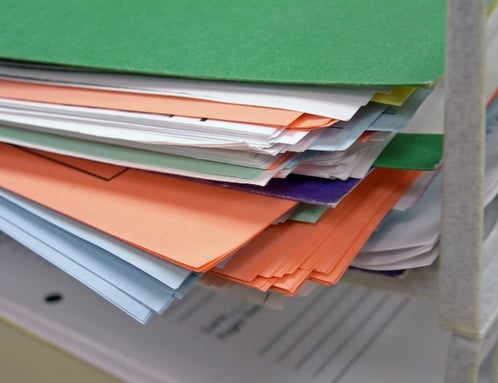23-Point Document Checklist to Put Your Affairs in Order
Tue, Jan 15, 2019
By: Jim Beran

Document management isn’t just for businesses. We all have important documents that we need for daily life – and that our loved ones will need in the event of our deaths.
At Gilmore Services, we specialize in document imaging and storage. Here’s a document checklist to help you put your affairs in order and ensure that you and your loved ones can find what you need.
#1: Your Will
The first document you need is your notarized Last Will & Testament. You can of course have your attorney keep a copy, but it’s a good idea to make it accessible to your family, too.
#2: Letter of Instruction
If your estate and will are complex, you may wish to leave a Letter of Instruction to simplify the execution and administration of your estate.
#3: Trust Documents
You may decide to leave some or all of your assets in a trust for your heirs. If that’s the case, you should store your trust documents with your will.
#4: Life Insurance Policies
Do you have a life insurance policy – or more than one? If so, make sure that copies are easily accessible, so your family can do what’s necessary to collect on them.
#5: Individual Retirement Accounts (IRAs)
Your IRA money is part of your estate and you can make things easier for your executor by placing your IRA documents with your other essential paperwork.
#6: 401(k) Accounts
Many of us have 401(k) accounts through work. If you have one, put copies of your statements and any other relevant documentation with your will.
#7: Pension Documents
If you were in the armed services or worked for the government, you may be collecting a pension. Many pensions are payable only for the life of the beneficiary, but your executor will need to notify the administrator.
#8: Annuity Contracts
Like pensions, annuities are usually not payable to your heirs. However, if you have an annuity agreement, your executor needs to know about it.
#9: List of All Bank Accounts
Accessing your bank accounts will be an important part of your executor’s job. Make sure to list the name of the bank, the account number, and any other relevant information.
#10: List of All User IDs and Passwords
So much of our business is conducted online today that it should come as no surprise that you need to make a comprehensive list of all of your user IDs and passwords.
#11: List of Safe Deposit Boxes
If you have valuable items in safe deposit boxes, make sure to list the banks and box numbers and leave the keys where they can be found.
#12: Housing, Land and Cemetery Deeds
If you own your own home, any land, or a cemetery plot, make sure that you leave copies of the deeds where your executor can find them.
#13: Escrow Mortgage Accounts
If you have any mortgage accounts in escrow, leave the documents for your executor.
#14: Proof of Loans Made and Debts Owed
Have you loaned or borrowed money, whether from a financial institution or a private lender? Your executor will need to know so they can settle the accounts.
#15: Vehicle Titles
Leave the titles of any vehicles you own for your executor.
#16: Stock Certificates, Saving Bonds, and Brokerage
Stocks, bonds, and information about your broker should be left with your will.
#17: Marriage License
If you are or were married, your spouse and executor will need a copy of your marriage license.
#18: Divorce Papers
If you are divorced, your divorce papers should be left with your other important documents.
#19: Personal and Family Medical History
It’s always a good idea to have a copy of your family medical history, and your children and grandchildren may need it.
#20: Durable Healthcare Power of Attorney
Designating someone to make medical decisions for you if you cannot is a good idea and can help your family handle an illness.
#21: Authorization to Release Healthcare Information
Healthcare information is private and may only be released with your permission. Leaving an authorization for your doctors to release information to your family can eliminate stress.
#22: Living Will
A living will is used to lay out your wishes if you are ill and incapacitated. Leaving written instructions will eliminate confusion.
#23: Do Not Resuscitate Order
Finally, if you have strong feelings about when and if extreme measures should be used to save your life, you may want to leave a DNR order to make your wishes clear.
Conclusion
These 23 documents should be saved, ideally both in paper and electronic forms. To learn more about how our document imaging services, please click here now.